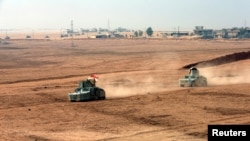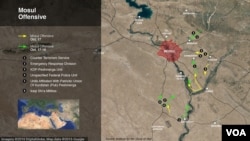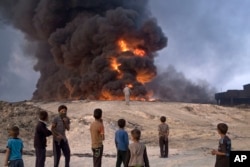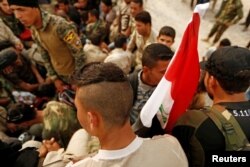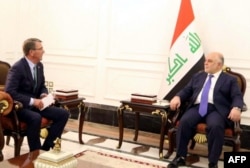The United Nations said Tuesday it has preliminary reports of extrajudicial killings and summary executions by Islamic State fighters around the northern city of Mosul, including the militants using civilians as human shields.
U.N. human rights spokesman Rupert Colville told reporters in Geneva the reports have not been fully verified, but include Islamic State killing 50 former Iraqi police officers they had been holding in a building outside Mosul, and in the village of Safina fighters killing 15 civilians and throwing their bodies in a river.
Colville said there also were reports of Iraqi forces finding the bodies of 70 civilians with bullet wounds in an area south of Mosul, but it was unclear who was responsible for the killings.
He reiterated calls for Iraq and allied forces to make sure their fighters to act according to international humanitarian law.
On Monday, U.S. officials said Iraqi forces had regained more than 800 square kilometers of territory from Islamic State since the fight to retake Mosul began last week.
Pentagon spokesman Navy Capt. Jeff Davis says the significant gains include Bartella, about 30 kilometers east of Mosul’s city center, which is now in the process of being cleared.
“This is probably the point on the map you could say is closest geographically [to Mosul],” Davis told reporters Monday at the Pentagon.
Iraqi forces and Kurdish peshmerga fighters have been moving through small towns to the north, east and south of Mosul as they work their way closer to the city itself.
Brett McGurk, special envoy for the U.S.-led coalition that has been conducting airstrikes against Islamic State targets for two years, wrote Monday on Twitter that after the first week all objectives of the campaign had been met thus far.
U.S. officials caution that progress will be slow and deliberate, however, with fighting expected to intensify the closer Iraqis and Kurds get to the city.
Islamic State diversions
Despite the gains around Mosul, Islamic State has carried out several attacks across the country over the last few days. U.S. officials are calling these attacks diversions meant to take the focus away from Mosul.
“This is to be expected,” Davis said. “We know that as they feel the pressure on Mosul they will try to divert attention as best they can by hitting elsewhere.”
On Monday, Islamic State attacked the northern town of Sinjar, where local media say Kurdish forces have since repelled the assault. Other IS attacks over the last few days targeted Rutba in the country’s west and Kirkuk in northern Iraq.
The terror group also poured oil into a sulfur-dioxide pit south of Mosul and set it on fire, releasing toxic gas in the area. The Pentagon said the gas is not considered lethal in the concentrations U.S. forces are seeing. Iraqi forces now have control of the sulfur-pit area and are trying to put out the fire, officials said.
Iraqi officials in Baghdad also said a series of small bombings in the capital killed nearly a dozen civilians Monday. No one claimed responsibility, but the Islamic State often has targeted areas in the Iraqi capital.
Airstrike investigation
Human Rights Watch called for an investigation into an airstrike last week during the IS attack on Kirkuk believed to be aimed at distracting Iraqi troops from the battle around Mosul.
HRW said the strike likely killed at least 13 people at a mosque near the city, but also noted the area was within shelling range of Kurdish and Islamic State positions.
U.S. military spokesman Col. John Dorrian said the coalition had definitively determined its forces were not responsible for the airstrike. The Iraqi government said it was investigating the situation.
Turkey-Iraq tensions
U.S. Defense Secretary Ash Carter held talks over the last few days with Kurdish leader Masoud Barzani in Irbil, and in Baghdad with Iraqi Prime Minister Haider al-Abadi.
Carter, who met Friday with Turkish President Recep Tayyip Erdogan, has sought to ease rising tensions between Ankara’s Sunni leadership and Baghdad’s Shiite government.
The two governments have been feuding over the presence of more than 1,000 Turkish fighters deployed near Bashiqa, Iraq, late last year. That Turkish force provided artillery cover for the peshmerga advance Sunday.
The December 2015 deployment was widely seen as an attempt by Turkey to ensure that its border with Iraq remains largely controlled by Sunnis and Iraqi Kurds, rather than by Iran-backed Shiite militia fighting alongside Iraqi forces to retake Mosul.
Baghdad repeatedly has demanded the withdrawal of all Turkish forces from the country, a demand that Turkey so far has ignored.
Chris Hannas contributed to this report from Washington.




